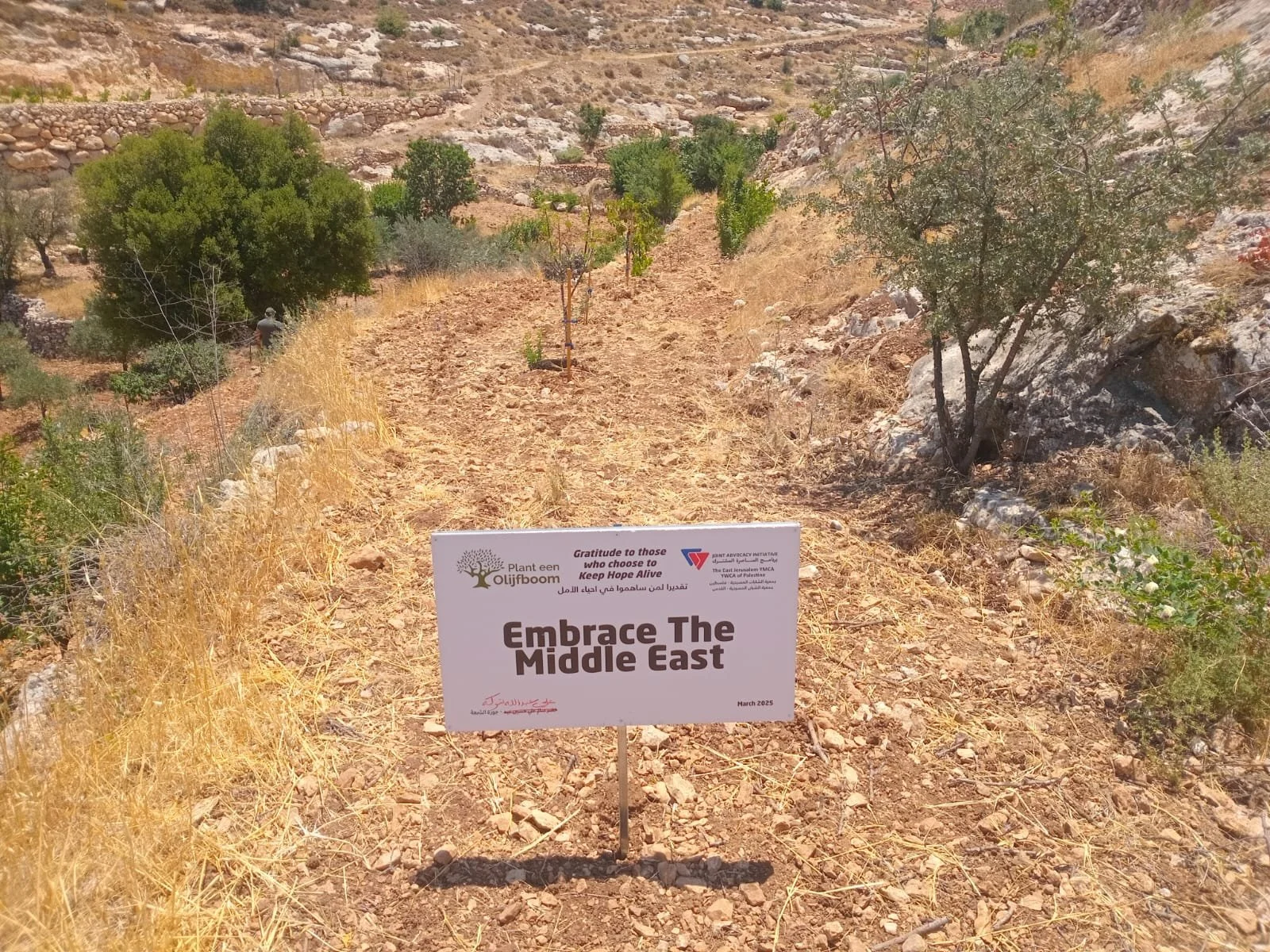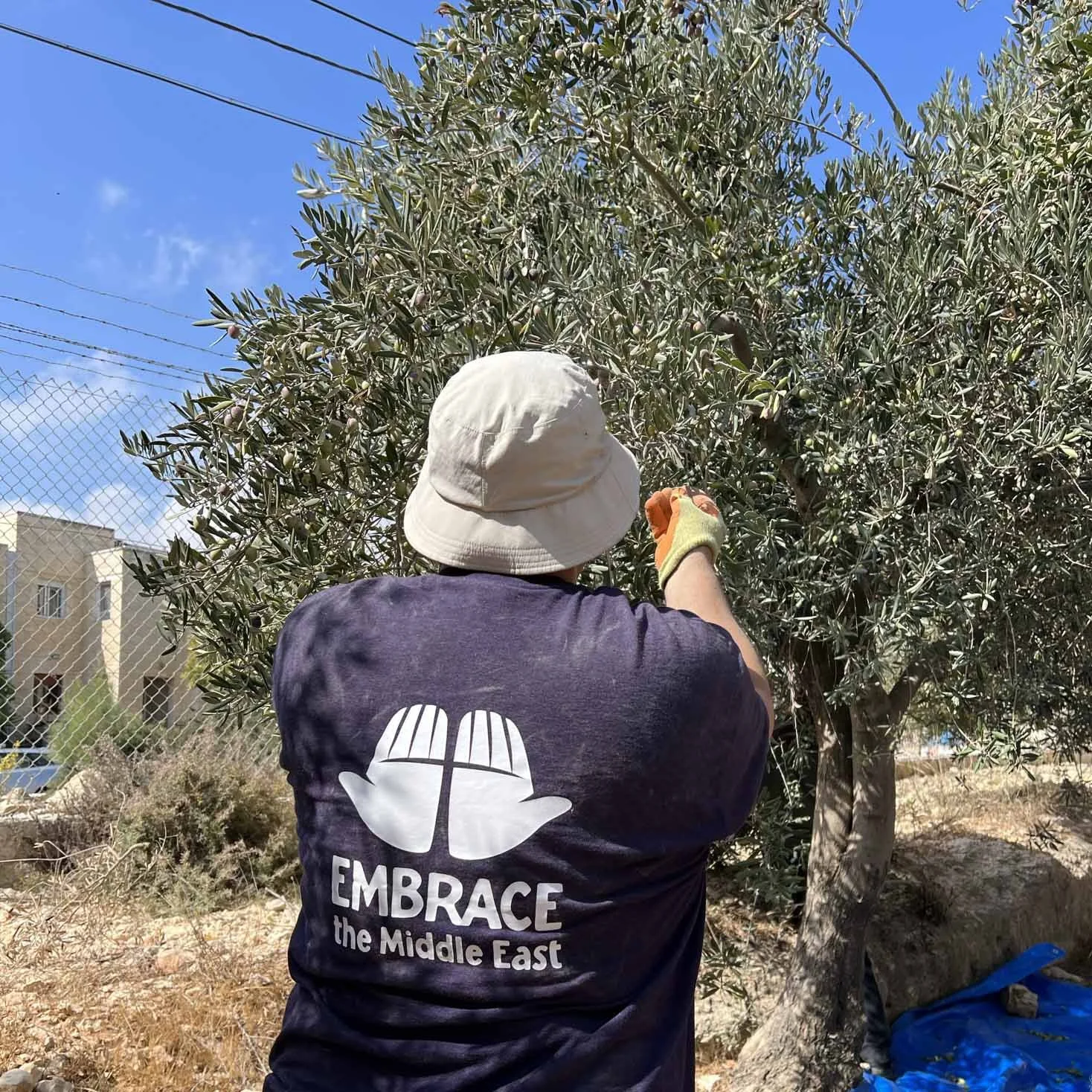The Olive Tree Project: Peaceful Resistance, Powerful Solidarity
October 2025
The Olive Tree Project is simple – you donate £20 to sponsor an olive tree and a sapling is planted on Palestinian land in the West Bank. It’s simple - but it’s effective! It’s a powerful and practical way for UK Christians to stand in solidarity with Palestinians who are facing ever-increasing restrictions, land seizures and oppression due to the Israeli occupation and settlement building.
Newly planted olive trees not only replace the Palestinian farmers’ trees that have been destroyed and help maintain livelihoods, but they also help to protect land from seizure for Israeli settlements by showing that it is in use.
Muhanad Al Qaisy, who is director of the project, spoke to us recently to explain why planting olive trees in the West Bank is so important at this time:
Expanding Israeli settlements mean there has been a massive increase in attacks on olive trees in the West Bank
Muhanad speaking at Greenbelt festival this year.
“From 1967 until these days more than 1,000,000 olive trees have been uprooted. Because of the building of the Israeli settlements and roads and the new construction that they are doing recently, there is a massive increase in attacks on olive trees in Palestine. It is much more often in the last 22 months, since the war [in Gaza] started.
“As we see more establishment of Israeli settlements or outposts, it directly affects and impacts the olive trees.
“Palestine is almost full of olive trees. All the mountains are planted with olive trees. So wherever there is action or construction for the Israeli settlement, that means there will be an attack on olive trees. Yesterday, for example, in a village called Al Mughayar near Ramallah they destroyed more than 1,200 trees with bulldozers. They just destroyed everything.”
The Olive Tree Project is planting more trees than ever before
“Last year we planted 90,000 olive trees. That's double the number that we planted years before. That's because of the situation, a lot more people want to support Palestinians. They are more aware of the Palestinian cause and when they start to hear about this campaign and the situation in Palestine, they feel they want to do something more.
“Our main partner in the UK is Embrace the Middle East. We have been working together since so many years and they promote the campaign. They are well known partner also for [other projects run by] Palestinians, so they know that the trees make a big difference. We have a strong relationship. We share reports, we share documents, we share photos. So, I think how we work with Embrace is really good.”
Newly planted olive tree saplings in the West Bank, 2025
The Olive Tree Project isn’t just replacing destroyed trees – new trees help protect land and livelihoods
“We asked our partners to promote the campaign more because in Palestine there are around 350,000 Palestinians used to work in Israel. Now they are not working anymore because they no longer have a permit. So, most of these people went to the land to cultivate and to start, you know, projects with farming. So, there is a demand in Palestine for more olive trees.
“We are not able to do anything against the occupation. So farming is non-violence resistance for them. They don't want to lose the land and they want to fight the occupation - but they don't fight it by violence; they are fighting now by planting olive trees. Farming is a way to express and to empty the anger that they have in a non-violent way.
“It is hard. People are trying to maintain their lands, trying to suppress their feelings, trying to do something physical because we are living under occupation and most of the people are stressed. The Olive Tree Project has helped them to take steps towards maintaining their lands, toward farming. In 2-3 years’ time, they can cultivate olives and they can make olive oil too.
“We are witnessing a huge attack by the Israeli settlers and the massive construction of the Israeli settlements in the West Banks, new roads and more checkpoints, more restrictions. All of this makes it difficult for Palestinians.
“More lands will be annexed [but] planting the empty lands with trees will help stop the Israelis taking more and more lands [as land with crops is harder to seize for settlements than uncultivated land].”
The 2025 olive harvest will be very difficult
“The harvest this year will be very hard for Palestinians, especially on the lands located near the Israeli settlements and near the bypass roads where it is difficult for the farmers to go to pick their olives. It was better when we could bring international volunteers to help [trips have been halted because of the current situation].
In previous years, international volunteers have been able to travel to the West Bank to help with the olive harvest.
“And in many places the farmers used to get permits from the Israelis to go to area C and to the other areas to pick their olives. This year there will likely be no permits; the last two picking seasons they [were] never issued. So [last year] a lot of farmers lost their olives, and the trees. No one picked them and no one reached there.
“During the last olive harvest, there were many attacks on Palestinian farmers and on the families. The settlers waited for them until they finished picking all the olives, then they went to the farm or to the fields, attack them, physically injure them, steal the olives. [In some instances] they even shot at them. They also put bombs on the trees and when the people come, it explodes.
“So, this olive picking season will be very hard. We are working to distribute around 200 first aid kits and 300 ladders, as well as sheets to catch the olives in.”
Replanting uprooted olive trees is an active but peaceful resistance
“For us, the work has doubled because what we used to do is just distribute the trees. Now we count how many trees get uprooted in our projects. It's also harder for us to reach some places. There are a lot of challenges. A lot of stories, a lot of documentation of the attacks. Every land that gets uprooted, we document and we write the story, we take photos and we replant it again. It is a very active resistance, on a daily basis.
“There is one lady who has planted her land three times. And the trees got uprooted by settlers. Three time she keeps saying that ‘this is my land and I will stand with my land’. She's really insisting on staying to replant the lands, even though they are constantly attacked. She never gets tired of this. She she's absolutely brilliant.
“When we go [to plant olive trees], we not only support 1 farmer; each farmer has his wife and his children. We are working in villages, so a lot of people. There's many members, like 6-7 members, in each family that we support. So, when we say we supported 1,600 farmers, that means you have to take into account that actually we are helping 7,000 people to have a better life, a better situation.”
SPONSOR AN OLIVE TREE TODAY
Stand with Palestinians and help them protect their land and their livelihood through peaceful resistance.





